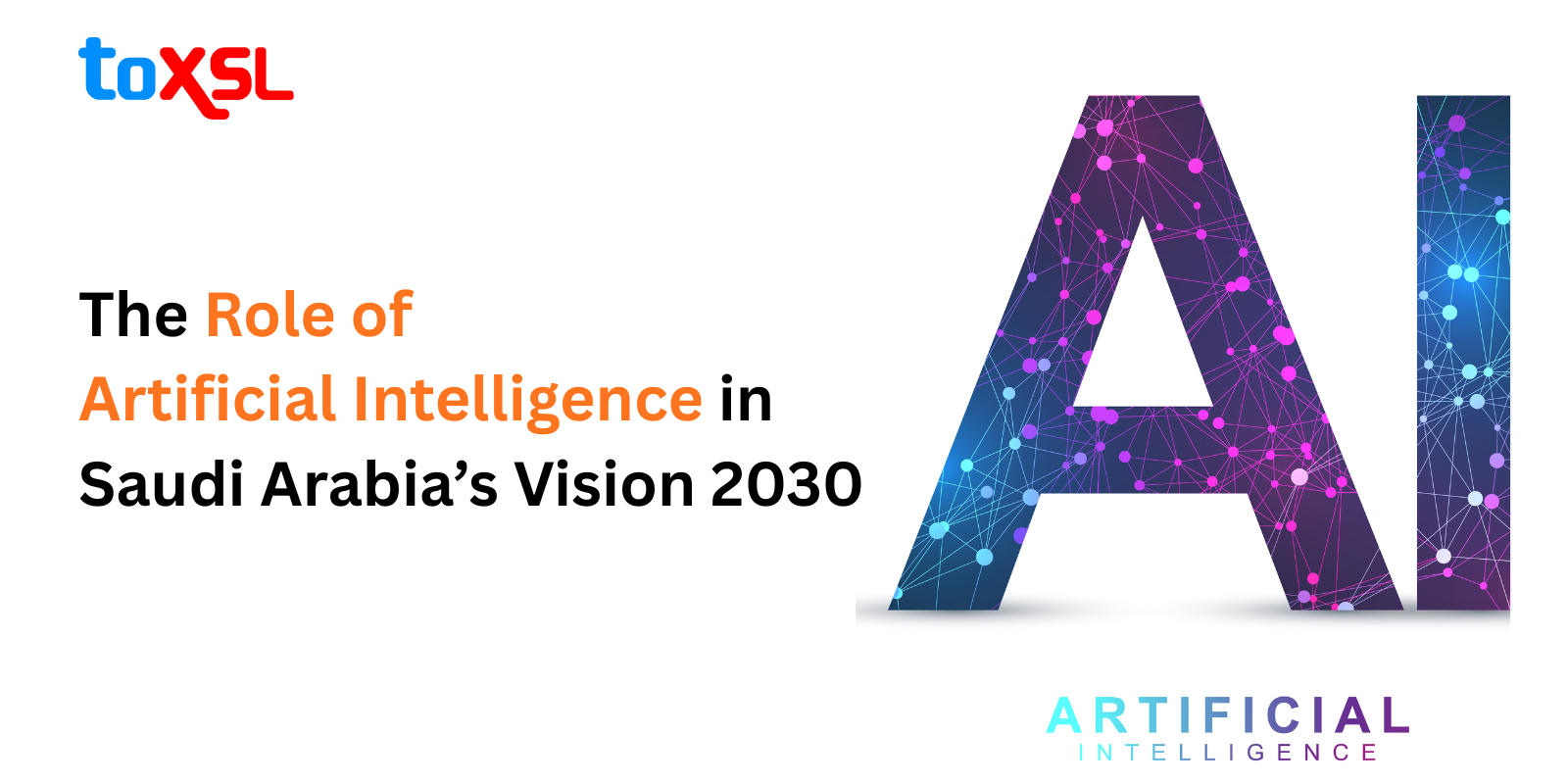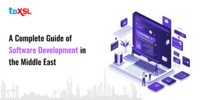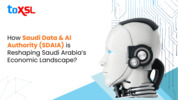- Oct 16, 2025
- Generative AI
- 4170
Share this post on:

Artificial Intelligence is actively shaping the Kingdom’s economy. The Artificial Intelligence market size is expected to reach $10.08 billion by 2031, growing at a CAGR of 26.19%.
Key Takeaways:
- AI is central to Saudi Arabia’s Vision 2030, driving economic diversification and digital transformation.
- The $100 billion Project Transcendence aims to position Saudi Arabia as a global AI leader.
- The National Strategy for Data and AI focuses on workforce development, research, and industry adoption.
- AI-powered smart cities and sectors like healthcare and education are transforming the Kingdom’s economy and society.
- Saudi Arabia’s leadership in AI ethics and global cooperation is framed by the Riyadh Declaration.
How AI is helping Saudi Arabia Support its 2030 Vision?
AI is a Key Part of the Transformation:
AI is seen as an important tool in Saudi Arabia’s plan to change its economy and society by 2030. The Saudi Data and Artificial Intelligence Authority (SDAIA), created in 2019, follows a clear strategy called the National Strategy for Data and AI (NSDAI). This strategy aims to use AI in many areas, including government services, businesses, and daily life. This plan helps make processes faster and smarter, encourages new inventions, and creates economic growth.
Helping the Economy Grow Beyond Oil:
According to Vision 2030, Saudi Arabia wants to reduce its dependence on oil money and develop a stronger economy based on technology and innovation. AI helps by improving industries such as healthcare, finance, energy, and transportation. For example, AI is used in smart city projects such as NEOM to manage energy, traffic, and services. While big companies like Aramco use AI to predict when machines need repairing, saving time and money. Banks use AI to spot fraud and make better decisions about loans. All these improvements support Saudi Arabia's goal of a more diverse and modern economy.
Improving Government Services:
AI makes government services faster and easier for people. The government uses AI chatbots and automated systems to answer questions and handle tasks without long waits. In healthcare, AI helps doctors diagnose diseases early and manage hospital resources better, improving patient care. AI also helps in education, energy management, and other public services, making life better for citizens.
Encouraging Innovation:
Saudi Arabia is focused on training many people to work with AI technologies. Schools are now teaching AI to students, and there are programs to train specialists and support new AI startups. International events and collaborations help bring ideas and partnerships to the country. This focus on education and innovation builds a strong workforce and encourages new businesses to develop AI solutions.
Creating Advanced AI Infrastructure:
The country is investing billions in building the technology needed for AI, such as huge data centers powered by renewable energy as part of "Project Transcendence." These centers provide the computing power necessary for AI research and applications. This infrastructure attracts global companies and researchers, helping Saudi Arabia lead in AI innovation.
Leading in Responsible AI Use:
Saudi Arabia is focusing on using AI responsibly. The Riyadh Declaration highlights the need for AI to improve access to technology, increase knowledge, and solve global issues while protecting privacy and fairness. The Kingdom works with other countries to develop global standards for safe and trustworthy AI.
Economic Impact:
AI is boosting Saudi Arabia’s economy and is expected to add over 135.2 billion to the GDP by 2030. This shows the potential of AI to create jobs, improve services, and make Saudi Arabia a global AI leader.
Sectoral Applications Transforming Saudi Arabia
Healthcare Revolution: AI apps in healthcare are advancing in Saudi Arabia, helping businesses contribute to this advancement by helping the healthcare industry diagnose diseases, improve diagnostic accuracy, and use predictive analytics to optimize patient flow and resource allocation. AI chatbots enhance patient engagement and streamline hospital administration, improving efficiency and user experience.
Energy and Industrial Innovation: AI optimizes oil field operations, enhancing decision-making processes for improved productivity and safety. Moreover, AI-driven innovations support sustainable energy efforts through intelligent grid management and renewable energy integration. Industrial companies are increasingly adopting AI in accounting systems and operational workflows, contributing to enhanced efficiency, reduced waste, and alignment with the Kingdom’s diversification agenda.
Smart Cities and Urban Governance: NEOM and other Vision 2030 urban projects use AI to develop smart infrastructure that improves transportation systems, waste management, energy use, and public safety. AI’s integration into these urban ecosystems enables real-time data analytics, predictive maintenance, and citizen-centric services that foster more livable, efficient cities. AI-powered governance reforms translate ambitions into action by enabling e-governance frameworks, automating processes, and improving public service delivery across sectors like education, finance, and municipal services.
Talent Development and Education Initiatives: Saudi Arabia has initiated programs to train local talent in AI and related fields. The educational department of Saudi Arabia is introducing AI for over six million school students, establishing AI-focused university courses, and training programs aimed at closing the gender gap, such as the Elevate program, which aims to train 25,000 women in AI and data skills over five years. The focus on education and professional development also supports the development of thousands of new jobs, positioning Saudi youth at the forefront of a global AI economy.
Global Collaboration: Saudi Arabia is engaging with global AI leaders to strengthen its AI ecosystem. The Kingdom is collaborating with technology giants such as IBM, Intel, and Zoom to facilitate technology transfers and joint research. The Saudi Arabia AI Summit acts as a main platform for dialogue between policymakers, entrepreneurs, and scientists, positioning the kingdom as a regional and global AI thought leader.
The Economic and Social Impact of AI under Vision 2030
By 2030, AI will help Saudi Arabia make billions of dollars. AI helps by making work faster and better, and by developing new businesses. This supports Saudi Arabia’s plan to grow its economy in different ways.
AI also makes life better for people. It helps doctors treat patients, gives better education, improves city life, and makes government services easier to use. AI helps women and young people by giving them special training and jobs, which helps the whole society.
Conclusion
Frequently Asked Questions
What role does AI play in Saudi Arabia’s Vision 2030?
Which organization leads Saudi Arabia’s AI initiatives?
How does AI help diversify the Saudi economy?
What are some key AI projects under Vision 2030?
How is Saudi Arabia preparing its workforce for an AI-driven future?
How does AI improve government services in Saudi Arabia?
What is Saudi Arabia’s approach to ethical AI use?
How is AI integrated into Saudi Vision 2030?
Artificial Intelligence is a core pillar in Vision 2030, aiming to transform sectors such as healthcare, transportation, energy, education, and smart cities. The government promotes AI research, startups, and technology adoption to improve efficiency and productivity.
What are some recent AI initiatives in Saudi Arabia?
Recent initiatives include the Saudi Data and AI Authority (SDAIA) projects, NEOM smart city AI integration, AI-powered healthcare solutions, and partnerships with global tech companies to deploy AI in industries and government services.
How is AI expected to impact the Saudi economy by 2030?
AI is projected to significantly boost Saudi Arabia’s GDP, enhance efficiency in government services, create high-tech jobs, and attract global tech investments. The country expects AI to transform traditional sectors like oil, energy, and logistics while fostering innovation ecosystems.
What are NEOM and AI’s role in it?
NEOM is a futuristic city being built in Saudi Arabia, where AI is embedded in smart infrastructure, mobility, energy, and healthcare. AI will help automate city operations, optimize resources, and enhance citizens’ quality of life.
Which sectors in Saudi Arabia are most affected by AI?
Healthcare, education, transportation, finance, energy, and government services are the most impacted sectors. AI applications include predictive analytics, autonomous vehicles, smart energy grids, and personalized learning platforms.
How is the Saudi government supporting AI development?
The government supports AI through funding research initiatives, establishing AI regulations, launching innovation hubs, and collaborating with universities and international technology firms to drive AI adoption.
Are there any ethical considerations for AI in Saudi Arabia?
Yes, Saudi Arabia emphasizes AI ethics, data privacy, and responsible AI deployment, ensuring that AI solutions are safe, transparent, and aligned with the country’s cultural and legal standards.
How can businesses leverage AI under Vision 2030?
Businesses can use AI to improve decision-making, automate processes, enhance customer experience, reduce costs, and develop innovative products and services. Vision 2030 encourages AI-driven entrepreneurship and startups.
Where can I find the latest AI news related to Saudi Vision 2030?
Latest updates are available from sources such as the Saudi Press Agency (SPA), SDAIA official website, NEOM news portal, and international technology news platforms covering AI developments in the Kingdom.









